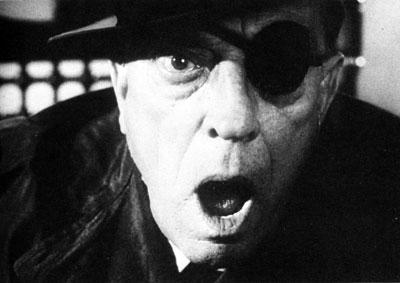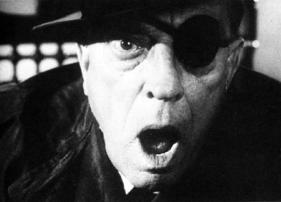Directed by Alan Schneider
Evergreen Theatre, Inc. Producer: Barney Rosset. Written and conceived by Samuel Beckett. Cinematographer: Boris Kaufman. Editor: Sidney Meyers. With: Buster Keaton, Nell Harrison, James Karen, Susan Reed. 35mm, b/w, 20 min.
Nobel Prize-winning playwright Samuel Beckett’s lone work for projected cinema was entitled archetypally, Film, and grew from Berkeley’s pronouncement, essi et percipi: “To be is to be perceived.” Yet Beckett’s ontological concerns have less to do with the plastic medium than the nature of recorded and projected images. Film is in essence a chase film; arguably the craziest committed to celluloid. It’s a chase between camera and pursued image that finds existential dread embedded in the very apparatus of the movies. The link to cinema’s essence is evident in the casting, as the chased object is none other than an aged Buster Keaton, who was understandably befuddled at Beckett and director Alan Schneider’s imperative that he keep his face hidden from the camera’s gaze. The archetypal levels resonate further in the exquisite cinematography of Academy Award-winner Boris Kaufman, whose brothers Dziga Vertov and Mikhail Kaufman created the legendary self-reflective masterpiece Man With a Movie Camera (with the latter in the titular role). Commissioned and produced by Grove Press’s Barney Rosset, Film is at once the product of a stunningly all-star assembly of talent and a cinematic conundrum that asks more questions than it answers.
Ross Lipman
Preserved in cooperation with the British Film Institute from a variety of 35mm and 16mm prints. Laboratory services by Cinetech, Ascent Media, NT Picture and Sound, Dolby Laboratories, and Audio Mechanics. Special thanks to: the Academy Film Archive, Edward Beckett, Nicole Brenez, Les Éditions de Minuit, Evergreen Review, David Gray, Shawn Jones, Jonathan Lee, Irène Lindon, Bruce Mazen, the Pacific Film Archive, Barney and Astrid Rosset.






 Mobile Navigation
Mobile Navigation


